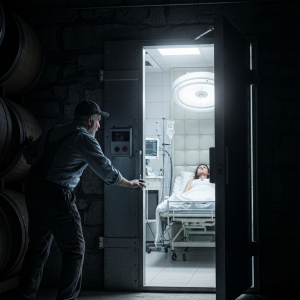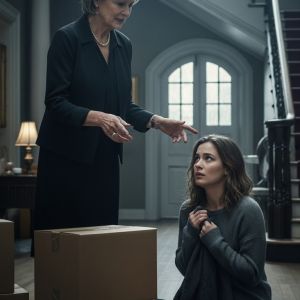My mom held me down while my dad arranged my wedding to a dangerous older man. So I ran away and exposed them all. Now, years later, she’s sick and begging me to come back because I’m “family.”
In my family, girls were promised for marriage the moment they had their first cycle. It didn’t matter if you were 12, 13, or 14; the blood meant you were ready for a husband at least three times your age. I grew up with this idea, so in my head, it didn’t seem that bad until I turned 11. That’s when I watched my cousin, Miam, get promised to a 43-year-old man just three days after her first period. His previous two wives had passed away before turning 20.
That was the first night I decided to stop eating enough food. Not because I disliked food, but because I noticed the skinnier girls in my family were the last ones to start their cycles, and I knew it was my only option. The other girls called me “skeleton,” but I didn’t care. Girls my age were already being promised to men who had children older than them.
That didn’t mean they stopped prepping me to be a wife, though. Every Friday, from morning until night, I was made to serve meals to male family members for hours without speaking. If I made eye contact or noise, I would receive lashes from a belt. I was forced to hold burning pots without oven mitts to “toughen up” my hands for kitchen work. Every night, my mom put skin-whitening cream all over my face so I could be “beautiful.” Other than the secret starvation, I was the perfect daughter. I played the part with zero complaints and always talked about how excited I was to have kids.
But when I was 14 and still hadn’t started my cycle, I found something that changed everything. My mom had convinced us that all of this was normal and that any girl who didn’t do this was bound to pass away alone, as well as being unattractive and useless. But one teacher, Ms. Rodriguez, forced me to have a meeting with her because I had accidentally worn a T-shirt to school and she saw how skinny I was.
When she walked out to go to the bathroom, she had forgotten to lock her drawer. Inside were books about marriage laws, pamphlets with titles like “Your Rights as a Young Teenager,” and “When Culture Becomes a Problem.” As I read, my jaw dropped. It was the first time I had been introduced to the idea that marriage under 18 was wrong, with no cultural exceptions and no parental consent loopholes. I stole the thinnest pamphlet, hiding it in my waistband.
Over the next few weeks, when my parents thought I was asleep, I memorized every page: phone numbers for CPS, shelter addresses, the exact words that would trigger a mandatory report. I learned that teachers, counselors, and doctors had to report suspected abuse by law. So, I started a “wife skills” group in my uncle’s tool shed. Six younger cousins who hadn’t bled yet, all desperate to avoid their fate. There, I taught them what I’d learned: which teachers were mandated reporters, how to say the words that would trigger an investigation. We practiced in whispers: “They’re forcing me to marry. I’m only 13. Please help.”
At 15, my body betrayed me. The blood came during morning food prep, soaking through my white dress. My mother’s scream of joy brought every woman in the house running. They were practically beaming, kissing my cheeks, telling me I was lucky. By nightfall, my father had already chosen my husband: Hammud Habibi, a construction mogul who’d seen two of his wives pass away once they turned 23. “Kidney failure,” the death certificates said. The women whispered it was from too many pregnancies, too young.
Two days later, my cousin Ana, a girl from the shed, got her period too. Within hours, she was promised to a 51-year-old who collected wives like trophies. I watched the light drain from her eyes as they discussed her bride price like she was livestock. That night, I slipped her my notebook with every shelter number, every legal fact, every escape route I’d memorized. “Tomorrow,” I whispered, “tell the science teacher. Use the exact words I taught you.” Her hands shook as she took it. “What about you?”
“My wedding’s not for two weeks. I’ll figure something out,” I responded, my voice shaking. But I was wrong. That night, there was a knock at the door. It was CPS. My father’s face went from confusion to fury as they asked about Anya, about underage brides, about forced marriages. The moment they left, the family circled like wolves. Someone had been teaching the girls lies. My journal was found hidden in the tool shed within an hour. My father burned it in front of everyone, calling me diseased, contaminated, and “a cancer that needed to be cut out.”
“The wedding is tomorrow,” he announced, “before she destroys anyone else.”
Dawn came too fast. In an hour, they would come to dress me in red and gold, to deliver me to a man who’d been connected to the passing of two girls already. As footsteps approached my door, I grabbed the plastic bag I’d hidden, stuffed with only the essentials: a change of clothes, the shelter addresses, and the $20 I’d stolen from my mother’s purse over months, $1 at a time.
The door handle turned. I clutched my stomach and doubled over, letting out a groan that wasn’t entirely fake. My mother entered, already dressed in her finest clothes. “Get up,” she commanded. “The beautician arrives in 30 minutes.”
I groaned louder. “Mama, something’s wrong. My stomach.” She frowned, approaching cautiously. In our culture, a sick bride was a bad omen. “I need the bathroom. Now.” She grabbed my arm. “You went 20 minutes ago.”
“Please,” I begged, letting tears stream down my face. “It hurts so bad.”
She released me with disgust. “Five minutes. The aunties are waiting.”
Once inside the bathroom, I locked the door and immediately stood on the toilet seat. The ceiling tile I’d loosened weeks ago shifted easily. I shoved the bag inside. Three minutes passed. I flushed, ran water, then groaned loudly again. “Mama, I can’t stop. My stomach.”
Her fist pounded the door. “Open this door!”
“I can’t,” I cried, standing on the toilet again. The small window above it had been painted shut years ago, but I’d been working at it with a stolen butter knife. I pushed the window frame with all my strength. The paint cracked, then gave way. Cool morning air rushed in. The opening was tiny, meant for ventilation, not escape. But months of starvation had made me small enough.
“She’s taking too long!” my father’s voice boomed. “Break it down!”
I grabbed my bag and shoved it through the window first. Then I pulled myself up, my shoulders scraping against the frame. The door shook. The lock splintered just as my legs cleared the window. I dropped six feet onto wet grass, my ankle twisting but not breaking. Behind me, shouts erupted. I ran, barefoot, my nightgown flapping. I sprinted across our backyard and into the neighbors’. Dogs barked, motion lights flickered on. I kept running.
Our neighborhood was a maze of identical houses filled with families from our community. Any of them would return me without question. I cut through yards, past pools, around sheds. A car engine roared to life behind me, then another. They had mobilized fast. I ducked behind garbage bins as headlights swept past. My cousin Omar’s voice carried through the air, “Check every street! She couldn’t have gone far!”
The main road was three blocks away, the bus stop four. I darted between houses, using parked cars as cover. My feet left bloody prints on the concrete. A piece of glass embedded itself in my heel, but I couldn’t stop. The bus stop came into view just as the morning bus pulled up. I burst from between buildings, waving frantically. The driver, an older woman, took one look at my bloody feet and torn nightgown and held the door. I climbed the steps and froze. No money. In my panic, I’d left the $20 in the bag. “Please,” I whispered, “I just need to get downtown.”
An elderly woman in the front seat stood up, pressing exact change into the machine. “Sit down, child,” she said softly. She didn’t ask questions, just guided me to the seat beside her and handed me tissues. The bus pulled away just as Omar’s car skidded into the parking lot. I ducked below the window, but not before seeing his face twisted with rage. The woman beside me shifted slightly, blocking me from view. “Whatever you’re running from,” she whispered before getting off downtown, pressing a $10 bill into my hand, “don’t go back.”
The courthouse was a massive building. I limped through the metal detectors, leaving bloody footprints. The family court clerk took one look at me and came around the counter. “Honey, do you need medical attention?”
“Emergency protective order,” I gasped out the words I’d memorized. “I’m 15. They’re forcing me to marry today. Please.”
She guided me to a chair and brought forms. She helped me fill them out, her face growing grimmer with each detail. She returned with a judge who read my petition right there in the lobby. “Granted,” he said. “Emergency order effective immediately.”
I clutched the paper like a lifeline and limped back outside. The shelter was 12 blocks away. I made it three before remembering they might not have beds. The phone call confirmed my fear. “We’re completely full. We can put you on a waitlist for Thursday.”
Three days. I had nowhere to go for three days. That’s when I remembered Ms. Rodriguez. Three buses and two hours later, I stood outside Jefferson High School. I found her in her classroom. She dropped her pen. “Oh my God.” She was around the desk in seconds, taking in my state. “Sit. Don’t move.”
She returned with a first-aid kit and began cleaning my feet. Only then did I start crying. “They were going to make me marry him today,” I sobbed. “He’s connected to the passing of two other wives. I got the order, but the shelter’s full, and I have nowhere to go, and they’re looking for me.”
She pulled out her phone. The CPS emergency line wasn’t encouraging. “We need more evidence of immediate danger,” the voice said. “Has she been physically harmed?”
Ms. Rodriguez’s face darkened. “She has glass in her feet from running barefoot. She’s covered in cuts.”
“Self-inflicted during escape doesn’t count. We need evidence of abuse from the family.”
My phone, which I’d forgotten about in my bag, rang. This time, Ms. Rodriguez answered it. “Hello?” Her face went pale. “Mr. Habibi? No, your daughter isn’t… What? No, she’s…” I heard my father’s calm, reasonable business voice through the speaker, saying I was sick, that I had “mental problems,” that I needed my medication. Ms. Rodriguez hung up. “How did he know you were here?”
My phone. They were tracking my location. “Delete everything,” she said. “Factory reset, now.”
As I wiped my phone, we heard car doors slamming in the parking lot. Ms. Rodriguez locked the classroom door. Footsteps echoed in the hallway. “We know she’s here!” my father called out. “She’s sick! She needs help!”
They tried the door handle, knocking, then pounding. “I’m calling 911,” Ms. Rodriguez whispered, but I grabbed her hand. “Wait. Let me try something first.” I rolled up my sleeves, showing her the circular scars from the pot training, the bruises from my mother’s attempts to force me into the wedding dress, the belt marks across my back. Her hands shook as she took photos. “Why didn’t you show anyone before?”
“I thought it was normal,” I whispered, “until I read your pamphlets.”
She called 911. The pounding intensified. Then my uncle’s voice, “We have her medication! She’s bipolar! Schizophrenic! She makes up stories!”
Police sirens wailed in the distance. The pounding stopped. By the time officers arrived, my father had transformed into a concerned parent, holding prescription bottles with my name on them. “Thank God you’re here, officers. My daughter is very sick.”
The officers separated us. The evidence was mounting: the essays Ms. Rodriguez had kept, my injuries, the fake prescriptions, the security footage of them arriving with the bottles already in hand, the emergency protective order. “She’s a minor who’s made credible allegations of abuse and forced marriage,” the CPS supervisor finally declared. “We’re placing her in emergency protective custody.”
My father erupted, lunging toward me, screaming in Arabic about dishonor. Two officers restrained him. The emergency placement coordinator, a tired-looking woman named Margaret, arrived. I was taken to a hospital to get my feet properly cleaned. Each call Margaret made ended the same way: no beds, no space for high-risk cultural cases.
That’s when Ms. Rodriguez had an idea. “I know someone. Theodora Whitman. A retired nurse. She’s done emergency placements before.”
The ride to Theodora’s house took 40 minutes, to a modest but well-kept home with security cameras at every corner. Theodora met us at the door, a sturdy woman in her 60s with sharp eyes and gentle hands. “You’re safe here,” she said simply.
The next days were a blur of safety planning and legal battles. My family tried everything: showing up at the house, sending flowers with guilt-laced notes, petitioning for my return claiming I’d been “brainwashed.” But the worst came when they used other girls. Videos began appearing online, cousins and family friends reciting rehearsed lines about how I’d corrupted them with dangerous ideas. My heart shattered watching their vacant eyes.
Then came the court hearing for the permanent protective order. My entire extended family filled one side, staring at me with disgust. My father’s lawyer painted a picture of a loving family torn apart by Western corruption. Then it was my turn. I focused on the facts: the scars, the beatings, the dead wives of Hammud Habibi.
That’s when the courtroom doors opened. A woman entered, followed by a CPS worker. “Your Honor,” the worker said, “this witness has information relevant to the case.”
My father went rigid. The woman took the stand. “My name is Fatima Habibi,” she said quietly. “I was Hammud Habibi’s first wife. I didn’t die.”
The courtroom erupted. Fatima continued, her voice steady. She was 15 when she married him. By 20, she’d had four children and her kidneys were failing. Her family told everyone she had passed away, but a nurse helped her escape. “I’ve been in hiding for five years,” she said, looking directly at me. “When I saw the Facebook posts about you, I knew I had to come forward. I couldn’t let him do to another girl what he did to me.”
Her testimony was devastating. The judge’s decision was clear: the protective order would be permanent. As we left, my father stood. “You are no daughter of mine,” he said in Arabic. “You are dead to us.” My mother, standing too, announced, “We have no daughter. She died today.”
The harassment evolved. My old social media accounts were hacked. My photo was circulated with warnings about a “sick girl.” But something else was happening. The information packets Ms. Rodriguez and I had made—guides to legal rights and escape routes hidden in school notebooks—were spreading. Girls started coming forward. A network was forming, hidden in plain sight.
My family’s final move came on a Monday morning: a formal announcement in the community newsletter. I had been officially disowned. My name was to be erased. In their world, it was worse than death. But as I read it, I felt something unexpected: relief. They’d played their final card, and I was still standing.
The next day, three more emergency orders were filed by other girls. The Freedom Network held its first official meeting. The war wasn’t over. It might never be. But as I took another call from a terrified girl, her voice shaking with fear and hope, whispering, “I found your notebook. Can you help me?” I knew we’d already won the battle that mattered most.
“Yes,” I said, grabbing my pen.




